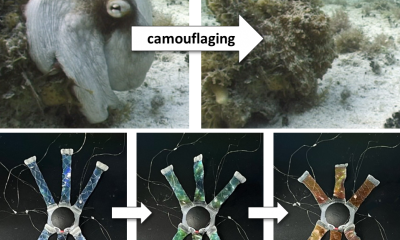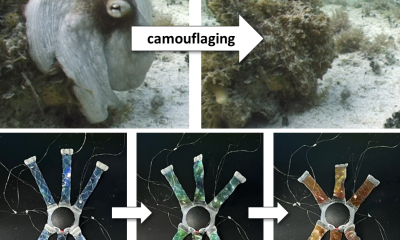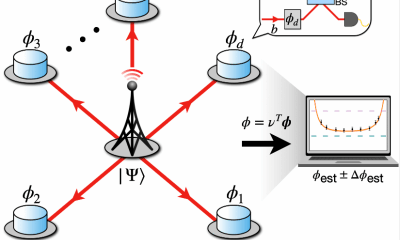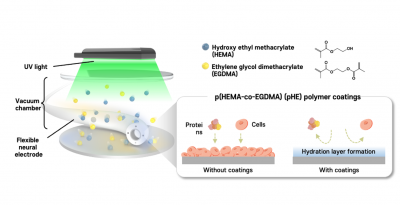Science
Researchers Enhance Lifespan of Brain Electrodes to Over Three Months
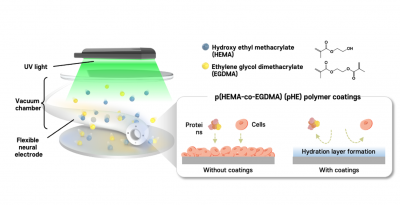
A research team from the Korea Institute of Science and Technology (KIST) has developed a new coating technology that significantly extends the lifespan of implanted brain electrodes. Led by Dr. Hyejeong Seong, the team has successfully increased the duration of signal recording from just one month to over three months. This advancement could have profound implications for neuroscience and medical therapies involving brain-computer interfaces.
The innovative research was conducted in collaboration with Prof. Seongjun Park from Seoul National University. According to KIST’s president, Sang-Rok Oh, this breakthrough addresses a critical limitation in existing electrode technology. Traditional electrodes often experience significant degradation within a short period, hindering effective long-term monitoring of brain activity.
Dr. Hyejeong Seong emphasized that the new coating not only enhances the lifespan but also maintains high-quality signal integrity, which is essential for accurate data collection. The team’s findings, published in 2023, highlight the potential for improved patient outcomes in various neurological conditions, from epilepsy to Parkinson’s disease.
Significance of the Breakthrough
The extended lifespan of these electrodes allows for more comprehensive studies and therapies over time. Currently, researchers face challenges when electrodes fail, requiring replacements that can disrupt patient care. The new technology could reduce these challenges significantly, making it easier to monitor and analyze brain signals continuously.
In practical terms, the ability to record brain activity for longer periods opens new avenues for research and treatment. For instance, it can facilitate better understanding of brain disorders and the development of effective interventions. Prof. Seongjun Park noted that this advancement may lead to new applications in neuroprosthetics and rehabilitation, ultimately improving the quality of life for patients with neurological disorders.
The research team at KIST is now exploring further enhancements to the coating technology. Their goal is to refine the material properties to ensure even longer electrode longevity and compatibility with various brain regions. This ongoing work demonstrates a commitment not only to technological advancement but also to addressing real-world challenges faced by patients and healthcare providers.
As the field of neuroscience continues to evolve, innovations like these underscore the importance of interdisciplinary collaboration. The partnership between KIST and Seoul National University exemplifies how shared expertise can lead to significant breakthroughs that benefit society as a whole.
In conclusion, the development of a coating that extends the lifespan of brain electrodes from one month to over three months represents a major leap forward in neurotechnology. With continued research and application, this innovation has the potential to reshape how brain disorders are treated and understood, marking a pivotal moment in the field.
-

 Science1 month ago
Science1 month agoNostradamus’ 2026 Predictions: Star Death and Dark Events Loom
-

 Technology2 months ago
Technology2 months agoOpenAI to Implement Age Verification for ChatGPT by December 2025
-

 Technology7 months ago
Technology7 months agoDiscover the Top 10 Calorie Counting Apps of 2025
-

 Health5 months ago
Health5 months agoBella Hadid Shares Health Update After Treatment for Lyme Disease
-

 Health5 months ago
Health5 months agoAnalysts Project Stronger Growth for Apple’s iPhone 17 Lineup
-

 Technology5 months ago
Technology5 months agoElectric Moto Influencer Surronster Arrested in Tijuana
-

 Education5 months ago
Education5 months agoHarvard Secures Court Victory Over Federal Funding Cuts
-

 Health5 months ago
Health5 months agoErin Bates Shares Recovery Update Following Sepsis Complications
-

 Technology7 months ago
Technology7 months agoMeta Initiates $60B AI Data Center Expansion, Starting in Ohio
-

 Technology6 months ago
Technology6 months agoDiscover How to Reverse Image Search Using ChatGPT Effortlessly
-

 Science4 months ago
Science4 months agoStarship V3 Set for 2026 Launch After Successful Final Test of Version 2
-

 Technology7 months ago
Technology7 months agoRecovering a Suspended TikTok Account: A Step-by-Step Guide



